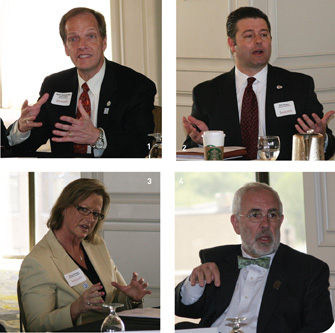
1. Mark Zimmerman said Kansas City’s “surprise” factor was a tool the region could use to leverage greater interest. | 2. Bill Chapin cited focus-group results that revealed an unfounded inferiority complex among residents here. | 3. Diane Forgy praised Kansas City’s efforts to cluster its recreational amenities in recent years. | 4. Collaborative ventures, said Brian Alexander, had allowed organizations to “cross-pollinate” the interests of patrons.
Other deals that Bill George has looked at as part of a city-appointed task force on hotel development did not provide enough security for taxpayers. He believes that
if an opportunity presents itself in which the city’s exposure could be capped, a deal might go through. He called it “a very, very difficult assignment, a risky project.”
“I think until we do something,” said Oscar McGaskey, “we’re going to stay where we are.” To be a serious player in the convention game, he noted, “you have to have a convention-center hotel.”
The Hotel and Lodging Association has looked at the project, said Tom Holden. “We’re not for it or against it. We let demand sort of drive that issue.” The big concern for his association right now is that Kansas City has some of the highest hotel taxes on rooms in the country. The group worries that if the state gives up an income tax in favor of a sales tax, and if a Downtown streetcar system demands another 1 percent increase, “The tax issue is eventually going to be a very, very serious problem to overcome.”
Rick Hughes noted that when New York City reached the 20 percent level in its hotel tax, the bottom fell out of that market until the taxes were lowered, and the city lost some of that business permanently. The question Hughes raised is whether Kansas City is using the 7.5 percent convention and tourism tax effectively.
“I would say it’s probably fairly well used,” said Holden. Most of it goes to debt reduction, maintaining Bartle Hall, marketing, and some to the Neighborhood Tourism Development Fund, a source of some historic controversy. Given the fact that several hotel projects were financed under the tax-increment financing program, the city is not collecting taxes to help with the marketing. That shortfall in marketing dollars would be even more obvious were a new 1,000-room hotel to come online through TIF.
“I agree with everything Tom has said relative to a Downtown hotel,” said Don Breckenridge. “I think our tax percentage is not good for us.” That much said, Breckenridge believes a large convention hotel downtown within walking distance of the convention center would be very good for the city.
Complicating the hotel issue, as Rick Hughes noted, is that there are fewer business travelers nationwide than there were just 10 or 20 years ago. “The hotel business lived and breathed by the business traveler, the road warrior,” said Hughes, “which is not the case any longer”—a phenomenon driven in part by videoconferencing technology.
Civic Structure
Rick Hughes pointed to the “more positive, robust, encouraging atmosphere within the city” and wondered whether the right civic apparatus was in place to sustain the momentum.
Although Tom Holden conceded there were a number of viable partnerships afoot, he noted that “we have a lot of organizations that go in their own direction.” He wondered whether there was a “remedy.”
Hughes was not sure there needed to be one. “I don’t know how you capture [the energy] and bring it all together.” He cited developments at the American Royal, which is proposing to replace the weary Kemper Arena with a new Agricultural Events Center. This move may be part of no one’s master plan, but is “a good idea because it’s happening, in addition to everything else that’s happening.”
Bill George revisited the idea of putting the convention assets in an authority model. Right now, they are managed by the city, which happily has a good manager in place, but good management has not been the historic norm.